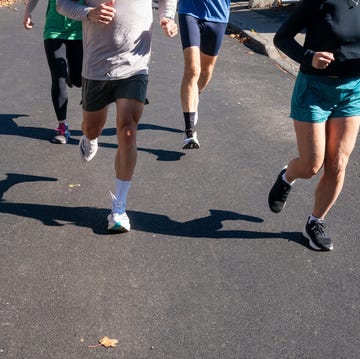Forum user rday1959 asks: William O. Roberts, MD above-the-neck-rule. I have had colds that lingered for a few weeks and it really didn't hold me back from running. But recently I got one of those really bad stuffy noses that lasted for about three days. I tried everything to relieve the symptoms, and it finally subsided only to be replaced by heavy coughing and burning in my chest. That lasted for about two days. Now I have a bit of a cough and a sore throat.
Do I wait until every bit of slight congestion is gone? Do I worry about the sore throat? This has me worried as my daughter just started school, and I have a feeling she has been—and will continue to be—bringing all sorts of germs into the house. When it comes to colds, when should people tough it out and when do you hold back when you’re recovering?
As my mother would say, “This is the $64,000 dollar question.” The neck check is a reasonable guide for when to stop running, though as I have said previously, it’s based on expert opinion and not on outcomes data. When to return is equally elusive, and not clearly defined with a firm evidence base. From a logical perspective, you should be “well,” but defining well is difficult. At a minimum, any fever should be resolved, muscle aches gone, and cough waning to the point that exercise does not trigger a coughing fit.
The lingering viral illness is the most difficult. There is one going through our area now and I am seeing patients in my clinic who have had symptoms for three to five weeks. This is the type of illness that puts a dent in your fitness plan. “Heavy coughing and burning in your chest” suggests it’s not the time to break your “exercise fast.” It is not unusual for a viral respiratory infection to start in the nose and migrate to the lungs; the tissue type is essentially the same. The underlying premise is “respect the virus” as any attack on heart muscle can be a long-term problem.
What I advise patients—and do myself—is to “dip a toe in the water” once the majority of symptoms are retreating and you feel like you can exercise without relapsing. That may be a couple of days into the illness or a couple of weeks. Beyond a few days, most exercise junkies get restless, but if you start out too soon and too fast it almost always causes problems. It is better to restart too late than too early.
So what does dipping a toe in the water mean? It may mean cutting back by 50 percent or more from your pre-illness volume and intensity. For me, the key is getting back to activity and feeling better after I have completed a run or bike ride than I did before I started. If I feel better, I start to ramp up slowly. If I feel worse, I stop, wait a day or even a few days, and try again at a slower pace and lower volume.
Part of the price of parenthood is re-arming your immune system to the bugs that kids are passing to each other in school. It is really the only thing kids can afford to give to their parents. But you can do things to reduce the transmission of illness. These are the same things we do in the clinic: wash hands well, avoid sharing things, get adequate sleep, and maintain good nutrition and hydration. Having your kids in the home passes all too quickly, so enjoy having your daughter around while you can. If you are lucky, she will bring home some grandkids for you to in two to three decades, and it will likely re-challenge your immune system.
* * *
Get answers to questions on health, injuries and sports medicine from runner-friendly physician William Roberts, M.D. If you have a question for the Sports Doc, please ask it on our DAA Industry Opt Out.













